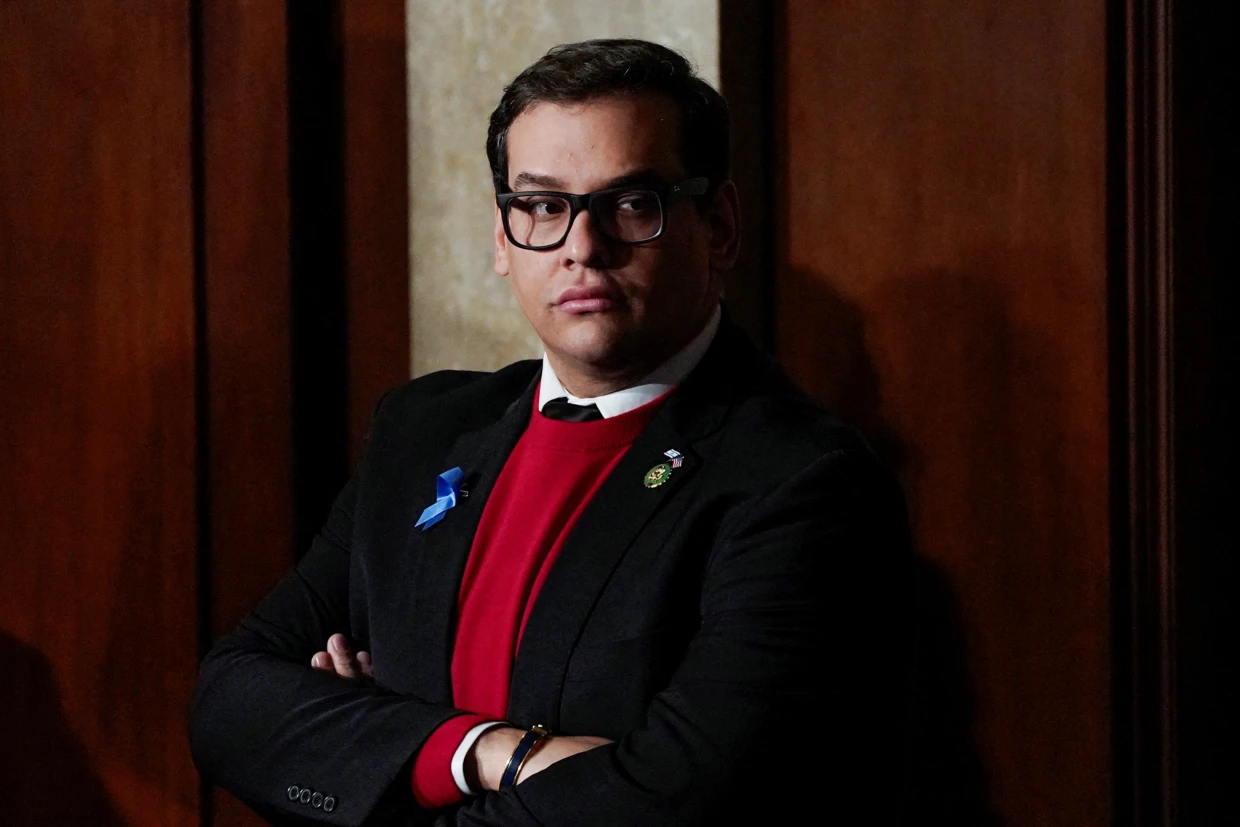House votes to expel indicted Rep. George Santos from Congress

Rep. George Santos, R-N.Y., in the House chamber at the Capitol on Oct. 18. Elizabeth Frantz / Reuters file
WASHINGTON — The House voted overwhelmingly to expel indicted Rep. George Santos on Friday, pulling the curtain down on a tempestuous term in office that was marred by revelations that he’d fabricated parts of his biography, a scathing House ethics investigation and a 23-count federal indictment charging him with crimes like wire fraud and money laundering.
Santos, R-N.Y., had survived two previous attempts to expel him this year — one in May and the other a month ago.
But Santos began losing significant support just before Thanksgiving after the bipartisan House Ethics Committee issued a damning 56-page report detailing allegations that Santos deceived his donors, filed false campaign statements and used campaign money to fund his lavish lifestyle.
Among the things he spent campaign funds on were rent, luxury designer goods, personal trips to Las Vegas and the Hamptons, cosmetic treatments, including Botox, and a subscription to the adult-content site OnlyFans, the report said.
Speaker Mike Johnson, R-La., said his leadership team wouldn’t whip the vote one way or the other, instead allowing members to “vote their conscience.” But just before the vote, he and his team came out in opposition to removing the freshman fabulist.
Johnson had previously signaled he would oppose expulsion, saying: “I personally have real reservations about things. I’m concerned about a precedent that may be set.”
Santos quickly became a political liability for a handful of vulnerable New York Republicans who were part of his same freshman class; his fellow New Yorkers — including Reps. Anthony D’Esposito, Nick LaLota and Marc Molinaro — led the push to oust him.
And while Ethics Committee Chairman Michael Guest, R-Miss., authored this particular expulsion resolution, he said he had closely coordinated with the New Yorkers to ensure they were the ones who forced the vote this week on the matter.
Just 11 months into his first term in Congress, Santos has admitted to lying about his background but denied any wrongdoing and pleaded not guilty to the nearly two dozen federal charges. He has repeatedly rejected calls from his colleagues to resign, including at a chilly early-morning news conference outside the Capitol on Thursday.
“Because if I leave, they win,” a defiant Santos told reporters. “This is bullying.”
He added: “I’m 35 years old. … It doesn’t mean it’s goodbye forever.”
His likely expulsion would put him in rare company: He would become just the sixth person in U.S. history to be expelled from the House of Representatives. Three were ejected for disloyalty after they supported the Confederacy during the Civil War. Two others — Michael Myers, D-Pa., and James Traficant, D-Ohio — were expelled in 1980 and 2002, respectively, after they were convicted of federal crimes.
Santos, who said last month he won’t run for re-election, had argued that expulsion would violate his due process rights, warning that the House would set a horrible precedent by booting him from office before he goes to trial.
“I will be No. 6 in the history, the first Republican, and the only one without a conviction or without having committed treason,” Santos said before the vote.
“If the House wants to start different precedents and expel me, that is going to be the undoing of a lot of members of this body,” he continued, “because this will haunt them in the future where mere allegations are sufficient to have members removed from office when duly elected by their people in their respective states and districts.”
Many in the far-right Freedom Caucus agreed with Santos’ argument and plan to vote no.
“The stuff that came out in a report that alleges what George has done — I don’t agree with that. I don’t,” said conservative Rep. Byron Donalds, R-Fla. “But to expel a member of Congress, you need to have been convicted in a court of law, not public opinion in the House chamber.”
The Justice Department has charged Santos with multiple federal counts, including identity theft, theft of public funds and money laundering related to campaign donations. He is set to go on trial in September.
“Santos allegedly directed Person #1 to falsely tell donors that, among other things, their money would be used to help elect Santos to the House, including by purchasing television advertisements,” prosecutors said in their indictment in May.
Two unnamed contributors then each transferred $25,000 to a company bank account that Santos controlled, prosecutors said. He then transferred the cash to his personal accounts, they allege.
“Among other things, Santos allegedly used the funds to make personal purchases (including of designer clothing), to withdraw cash, to discharge personal debts, and to transfer money to his associates,” the Justice Department said.
He’s also charged with making false statements to Congress on his financial disclosure form, in part over allegations he overstated his income and holdings and didn’t report other sources of income.
One of those other sources of income, the indictment alleges, is Covid unemployment benefits he put in for — even though he was employed at the time.
Santos’ expulsion would mean a special election would be held for the competitive Long Island-based seat.
New York Gov. Kathy Hochul, a Democrat, would have to declare a special election within 10 days of the vacancy. Under New York law, the special election would have to take place 70 to 80 days after she issues her proclamation.
The race to succeed Santos is expected to be hotly contested, with his seat already having attracted candidates from both sides of the aisle, including several GOP challengers who were intending to oust him in a primary.
Santos won his first term in November by 8 percentage points, an upset win in a district that President Joe Biden had carried in the 2020 election by 8 points.